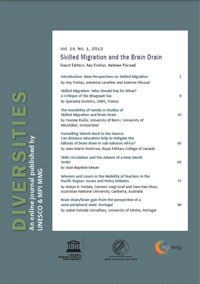Introduction: New Perspectives on Skilled Migration
by Any Freitas, Antonina Levatino and Antoine Pécoud
Skilled migration has been the object of intense scientific and policy debates for nearly five decades. This is quite understandable, as few issues display greater complexity. Skilled migration is marked by a number of fundamental dilemmas and trade-offs, in terms, for instance, of conflicting rights to development, education, (e)migration and equality. It also often opposes political principles, ethical and political imperatives (such as global justice, individual freedom, or the control of people’s mobility), as well as actors (such as states, corporations and migrants themselves).
New ideas and perspectives have regularly reshaped the way skilled migration is apprehended; a few buzzwords – brain drain, gain or waste for example – have played a central role in embodying the key arguments and, in some cases, certain policy initiatives. These macro-considerations have developed along more detailed analysis, which addresses different aspects of skilled migration, with a particular emphasis on sophisticated empirical economic assessments of its impact on growth or development. In this context, contributions to this issue attempt to explore the different issues raised by skilled migration in a transversal manner. These include political implications, economic and policy impact, and ethical dilemmas. This introduction provides a short overview of the debates and of the main arguments developed in this issue of Diversities.
Suggested bibliographic reference for this article:
Freitas, A., Levatino, A., & Pécoud, A. (2012). Introduction: New Perspectives on Skilled Migration. Diversities, 14(1), 1-7. Retrieved [todaysdate] from https://newdiversities.mmg.mpg.de/?page_id=2024
|
